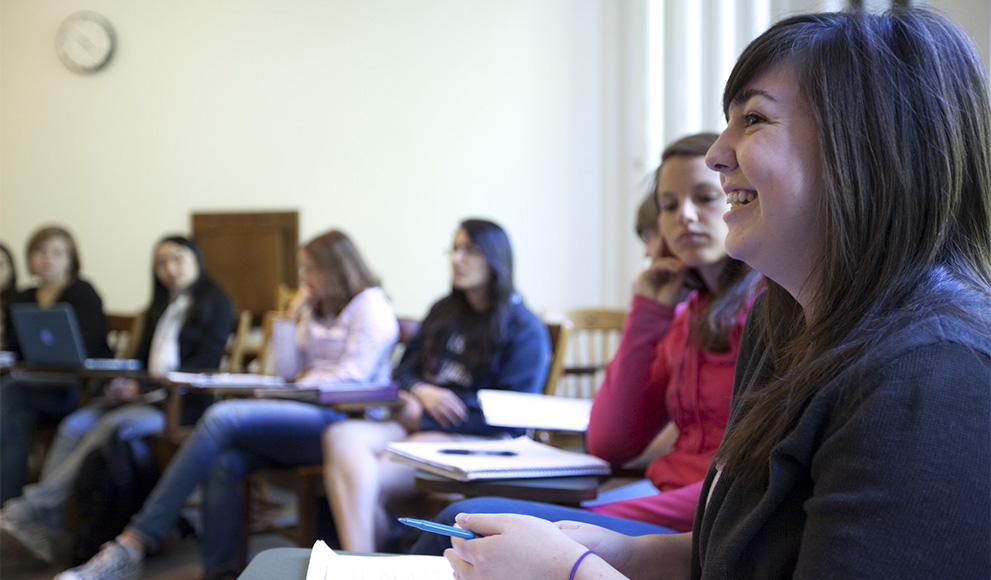Visiting Ambassadors Enrich Wellesley Students' Understanding of Diplomacy and Current Events

Because free inquiry and discussion are essential to educational development, special engagements outside of the classroom, such as speeches and lectures, are an important part of the liberal arts tradition. Wellesley hosts many events throughout the year and, often, classes are able to attend these events together and use the experience to add context to what they are learning in the classroom.
During the fall 2015 semester, the Honorable Robert A. Sherman, U.S. Ambassador to Portugal, visited campus as part of the Portuguese Lecture Series at Wellesley. Then, in February of this year, Gérard Araud, France’s ambassador to the United States, gave a lecture in the Susan and Donald Newhouse Center for the Humanities.
António Igrejas, Mellon Foundation Lecturer in Portuguese, attended Sherman’s lecture with members of his PORT 203: Intensive Intermediate Portuguese and PORT 241: Introduction to Lusophone Studies classes. "Students were very curious about the ambassador’s job and experiences in Portugal," said Igrejas. "His visit and lecture extended the classroom experience of our Portuguese students. It also provided, within a global context, a firsthand testimony of Portuguese culture and the intricacies of U.S.-Portugal/European diplomacy."
The event was covered by the Portuguese Times, which serves the Portuguese-speaking communities of New England.
Leilani Stacy '18, a double major in economics and political science, was eager to hear Sherman talk about his role and approach to diplomacy. She began studying Portuguese in 2014 and studied abroad during the summer of 2015 in Lisbon, where she also worked in the press office of the Ministry of Foreign Affairs and heard Sherman speak at the U.S. embassy.
"These sorts of visits by diplomat/VIP guests provide an opportunity to learn from global leaders and ask honest questions about their professions and experiences, which I think truly embodies the College's mission to shape Wellesley women to be the ones who will minister, and not to be ministered unto," she said.
Gérard Araud, France's ambassador to the United States, gave a lecture in February on French foreign policy in an unstable world. Smitha Radhakrishnan, associate professor of sociology, and her students in SOC 309: Nations in Global Intersectional Perspective attended the event. To prepare them for the lecture, Radhakrishnan assigned the students readings on French foreign policy, including one from the 1970s and a recent article on the 2015 terrorist attacks in Paris and the country's stance on Islamic extremism.
Students sent Radhakrishnan questions for the ambassador based on those readings, and she compiled a selection that she thought worked well together. "Much to our surprise, the ambassador was able to address almost all of our questions," said Isabelle St. Clair '17, a peace and justice studies major. "I particularly liked that he didn’t shy away from hard questions from audience members."
Kat Mallary '17, an American studies and political science major, also found the lecture enlightening. “The ambassador discussed, both overtly and more subtly, how nations 'create' their own images: how they construct a historical narrative that both justifies their pasts and drives their foreign policy actions in the present," she said. "Having just discussed this phenomenon in class in the context of the United States, it was exciting and helpful to have the example of France to compare and contrast."
Radhakrishnan said the ambassador's talk has shaped recent discussions in her class because he touched on many of the themes that arise in the course, such as tensions around exclusion and inclusion for members of nations who do not fit into the dominant group; the ways terrorism strengthens the nation and nationalism, even as it seeks to undermine it; and the legacy of colonialism.
"Understanding how (and the extent to which) nations and nationalism are concepts that organize how we think, how we understand our place in the world, and how we think about identity and belonging, are important subjects in the course," she said. "I aim for students to come to grips with the contradictions built into nations and nationalism—that they have both constructive and destructive potential. And I aim for students to gain a deeper understanding of how globalization relates to identity."
Shweta Patwardhan '16, an international relations/political science major, recalls an example of that from the ambassador's Q&A segment. "He talked about when he was growing up and the way that he conceived what it meant to be French, which at that point meant white and Catholic," she said. "That is now changing."
The ambassador also discussed how a nation's history can affect its response to certain events, Patwardhan said, such as the recent influx of immigrants from the Middle East. "Because France is a technically secular country, its public institutions struggle with how to address demonstrations of faith like head coverings," she said.
All three students appreciated the chance to see how the theories they are learning in class relate to current events and to their development as future leaders. One crucial lesson, regardless of which profession the students ultimately choose, is the need for diplomacy.
Other recent high-profile visitors include Salman Rushdie, Diane Ravitch '60, Louis Lee Sing, a former mayor of Port of Spain, Trinidad, and Mass. State Rep. Antonio Cabral. On April 25, Mass. State Senator Michael Rodrigues will visit Igrejas’ Portuguese 203 class.
